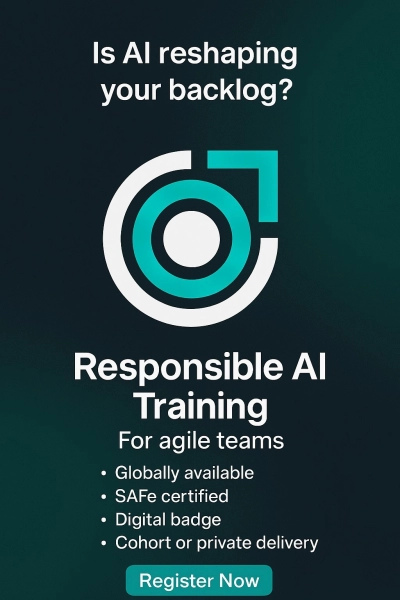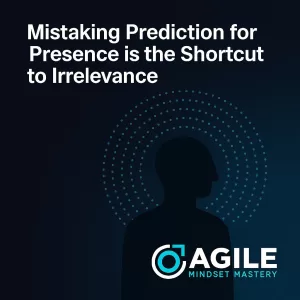How AI is Reshaping Agile Delivery (and What to Do Next)
Agile delivery is being redefined—not by new frameworks, but by new intelligence. As tools like Jira AI and ClickUp start predicting, prioritising, and prompting on our behalf, one question emerges: Who’s driving the sprint now?
Share this article:

Daily Lens — 21 July 2025
AI Disturbance:
“When your backlog grooms itself, who’s really driving the sprint?”
Agile delivery is being redefined—not by new frameworks, but by new intelligence. As tools like Jira AI and ClickUp start predicting, prioritising, and prompting on our behalf, one question emerges: Who’s driving the sprint now?
This post explores how AI is quietly reshaping backlog refinement, team roles, and ethical decision loops—and why the real challenge isn’t adopting AI, but adapting our mindset to collaborate with it. We also introduce SAFe-aligned Responsible AI training to help you lead the shift, not react to it.
What’s Really Changing?
The agile world is experiencing a quiet revolution. No press releases. No reorgs. Just one subtle shift after another: AI is no longer a sidekick. It’s a sprint co pilot.
Traditionally, backlog grooming, or refinement, has been a critical human touchpoint in agile delivery. The product owner leads, the team contributes estimates, stories are clarified, priorities are negotiated. These sessions are where shared understanding is built, ambiguity is reduced, dependencies are surfaced and complexity is confronted head-on.
Now? AI-enhanced tools like Jira and ClickUp are changing the game.
Atlassian’s Team ’24 event made it clear: Jira is transforming. Not just a ticketing tool, it’s becoming an intelligent system capable of backlog grooming, forecasting, and workload balance. Before you even log in. ClickUp is offering similar AI enhancements, surfacing blockers and prompting team members for updates without human nudge.
This isn’t about eliminating humans. It’s about reframing how human intelligence leads when machine intelligence removes the noise. But the jump comes with risks:
-
Contextual nuance is easily lost. AI doesn’t see politics, pressure, or the hidden risk in a quiet ticket.
-
Team learning fades. Refinement sessions often double as informal onboarding, product familiarisation and knowledge transfer.
-
Strategic trade-offs vanish into logic trees. There’s no room for the messy brilliance of human judgment. (Let's not forget team building in remote first scenarios)
-
Dependencies dissolve into silence. AI can surface relationships between tasks, but it doesn’t question political blockers, team bandwidth, or cross-stream clashes. Human-led refinement isn’t just about sequence; it’s about negotiating space between priorities.
Framework Insight (F.I.X.):
"F (Feed): In traditional agile, teams rely on visible status updates—what’s done, what’s blocked, what’s next. With AI-powered tools, that layer is being replaced by predictive signals: alerts about potential delays, workload imbalances, or shifting dependencies—often before anyone asks. Instead of looking back at progress, teams are nudged to act forward, guided by AI-generated insight. The question is no longer "what happened?" but "what needs attention now?"
I (Impact): AI allows teams to redirect their energy toward work that moves the needle—problem solving, adaptive iteration, creative insight. By handling routine admin and surfacing key issues automatically, AI clears space for deeper engagement. But this only becomes an advantage if teams know how to translate insight into intentional action and take advantage of the space AI has created for this to happen. Problem is, we as a species are unlikely to do this without high levels of discipline. And in th erush to deliver, we know what happens!!
X (Xpect): Adoption is just the first step. To truly benefit from AI, teams must treat it not as a tool to manage, but as a partner to collaborate with. This requires a new kind of fluency—one where team members can interpret AI prompts, challenge its suggestions, and refine workflows through dialogue, not just configuration. The future-ready team is one that doesn’t just use AI, but shapes with it."
Role Shifts & Ethical Readiness:
The introduction of AI into agile delivery doesn't just automate tasks—it reshapes roles. The Product Owner may evolve into a Strategic Insight Curator, guiding not just backlog content but AI interpretation and decision validation. Scrum Masters may pivot to become AI Collaboration Coaches, helping teams navigate tooling, signal interpretation, and bias detection. Developers become Prompt Engineers and Workflow Designers, curating human-AI interaction loops that protect intent and quality.
But this shift isn't just operational, it’s ethical.
Organisations need more than feature rollouts. They need ethical implementation frameworks. Who governs AI decisions in sprint planning? What’s the escalation path when AI guidance misfires? How does your organisation ensure transparency and alignment between machine logic and human values?
Without a shared plan for AI adoption, every agile team becomes a pilot project but with no map or compass to anvigate this new landscape.
Does your team know how to:
-
Escalate AI-made prioritisation decisions?
-
Challenge a model’s logic?
-
Embed ethical checkpoints across the delivery cycle?
- Ensure client demands are met without exposure to litigation down the line?
The move from process to partnership must be matched with clarity, care, governance and policy.
Training for Real-World AI Readiness:
The shift to AI-augmented agility requires more than good intentions—it demands capability. That’s why we now offer targeted training in Responsible AI, built around the SAFe framework. This course equips agile teams, coaches, and leaders to:
-
Translate ethical principles into delivery practice
-
Embed governance and reflection into every sprint
-
Strengthen decision quality in AI-augmented environments
Unlike generic AI courses, this training is tailored specifically to agile-at-scale contexts, delivered by practitioners who understand both systems and ethics. Whether you're scaling agile across teams or enhancing a single product stream, this training gives you the tools to lead confidently, collaborate intelligently, and deliver responsibly.
In the future, agile teams won’t just be evaluated by velocity, but by how well they govern, adapt, and learn alongside AI.
AI Reflection:
If AI is rewriting the rhythm of agile delivery. How are you rewriting your role?
-
Are you still facilitating standups that could be async and AI supported?
-
Do you know how your tooling is making strategic decisions on your behalf?
-
Can your team distinguish between automation and actual agility?
- Are you tracking how your role is morphing and are you active in shaping what it will become?
CTA:
Agile isn't dying. It's morphing.
AI won’t replace your team.
But the teams that learn how to partner with AI will replace the ones that don’t.
Rewire Agility with Responsible AI
Responsible AI is no longer a technical issue—it’s a leadership one. This short course helps organisations build ethical, transparent, and risk-aware practices into every level of agile-at-scale delivery. From PI planning to sprint execution, you’ll learn practical strategies to maximise innovation while reducing unintended harm.
Training is available directly through our advisory services—delivered by a certified SAFe Practice Consultant (SPC) with deep experience in Responsible AI implementation.
Register your interest now to access the next training window or book a private cohort for your leadership or agile team. Training is available across time zones to suit global delivery needs. Certification and digital badges are awarded on successful completion.
Let’s map your toolchain → [Book a strategic session]
Part of the F.I.X. system. Rewire how you lead.
Read more blog posts
07 Aug 2025
The Cost of Ageism: What Businesses Are Missing by Silencing Experience
Discover how ageism in hiring, product design, and AI development is silently damaging business performance. Including over-55s isn’t charity, it’s strategy. From customer service to innovation, companies silencing experience risk losing market trust, product quality, and long-term sustainability.
18 Jul 2025
Daily Lens: AI vs Human Intelligence
Both Predict - Both Forget - Both Similar - But Different AI is prediction. You are perception. But both forget and humans are better at denying it. Mindset and bias awareness aren’t soft skills. They’re system stabilisers. Keep showing up. That’s the part no machine can do for you.

17 Jul 2025
Why Your Team Isn’t Learning Fast Enough
(And What To Do About It)
You can deliver fast. But can you learn fast enough to keep delivering the right things?
Most teams confuse movement with momentum — speed with sense-making.
Get in touch
We want to hear from you
If you're ready to break bias, decode decisions and unlock success, we're here to help. Let's get your transformation journey started!
